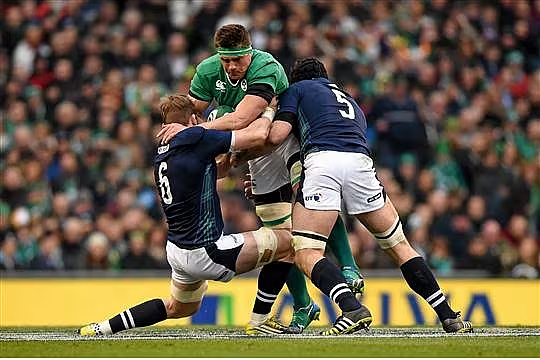Welcome to international rugby CJ Stander. The Munster backrower was so good that he made the Six Nations team of the tournament for most people - beating out the likes of Irish & British Lion Dan Lydiate, and former England captain Chris Robshaw.
Even I had Stander in my team of the tournament. He's been one of my favourite players since he joined Munster nearly four years ago.
In four of Stander's five games - he literally tried to carry the Irish team on his back. He posted stats of at least 15 carries in those four games - twice passing the 20 carry mark. To put that in context, carrying ten times in a game is considered an impressive outing. But 20 carries? That's rare.
Stander was everywhere in the final game of the championship against Scotland. His 16 carries in the first half was remarkable, and he was a huge consideration for man of the match because of it.
Is it a good thing that Stander carries so much?
Clearly they show a good player working extremely hard and playing well. It's extremely rare for players to carry that often - so Stander's work means he's doing really well right?
Well yes, and no. There's a reason why having that many carries is rare. The best players in the world mix their game up more than that. You wouldn't see Kieran Read carrying the ball that often.
Back to the first half yesterday, another telling stat from Stander was that he had exactly zero passes. Meaning that every single time that Stander got the ball - he took it into contact. If you're a defender when Stander gets the ball - you know exactly what he's going to do. It means he gets double-tackled more often because the defence isn't afraid of a sneaky pass into space.

Let me remind you of another player who used to do that a lot. Remember Andy Powell? He came into the international scene with Wales in 2008 and defences didn't know how to cope with his ball-carrying. They weren't used to it. It was one of the tools that helped Wales win the Grand Slam in 2008.
But Powell went away after that. He was never that effective. Defences quickly realised that Powell was never going to pass the ball and adjusted accordingly.
Going back to Stander - when you see how many metres he made on those monstrous amount of carries - 119 metres from 87 carries in the tournament with 13 passes - it isn't a massive amount. Compare that to Jamie Heaslip's tournament stats - 27 passes, 62 carries, and 129 metres made. It's interesting that despite carrying the ball less, Heaslip managed to make more metres.
A potential reason could be simply that Heaslip passes more than Stander - and defenders know that. So when Heaslip gets the ball - they don't know if Heaslip will take the ball into contact or pass. It keeps defenders on their toes, and allows Heaslip to make more yards when he does carry. Jamie Heaslip isn't as good a ball-carrier as he used to be, nor is he as good as CJ Stander - but he uses that doubt in the defenders mind to his advantage.
Watch how Ma'a Nonu does it. The bulky centre added a new dimension to his game in reason years, going from just a battering ram to an all-rounder. This try he creates for Ben Smith comes because the defenders think he's going to carry the ball - but his deft pass allows Smith to walk in untouched.
Imagine if Stander passed the ball on the gainline, or made an offload or two? It could be devastating, and could leap Stander into the conversation for the best in the world. Because with his ball carrying, work-ethic, and ability at the breakdown - there isn't much that Stander can't do.
Making him more than just a battering ram in attack could reap some serious dividends.
It could be what brings him from a great player to a world class player.
See Also: The Combined Team Of The Six Nations Features Three Ireland Players
See Also: CJ Stander's Hand-Off Epitomised His Beast Mode Six Nations
Photo Credit Sportsfile










